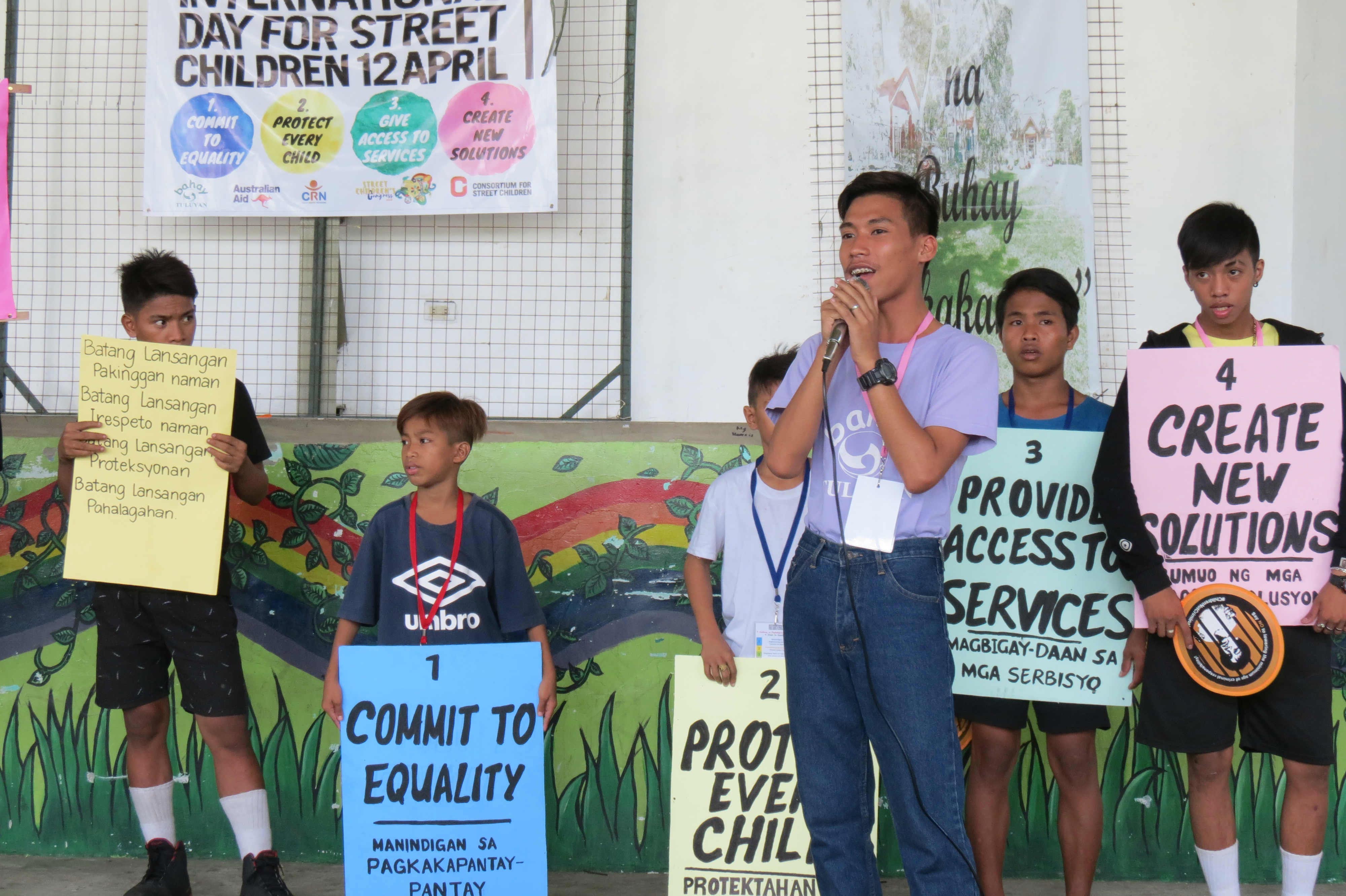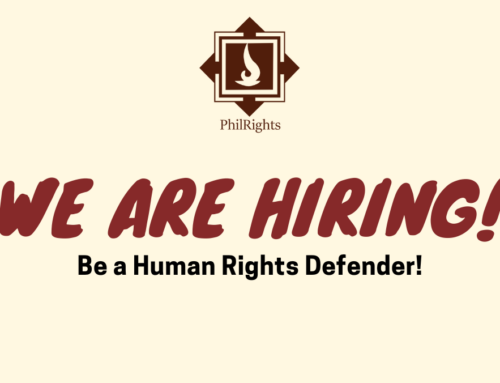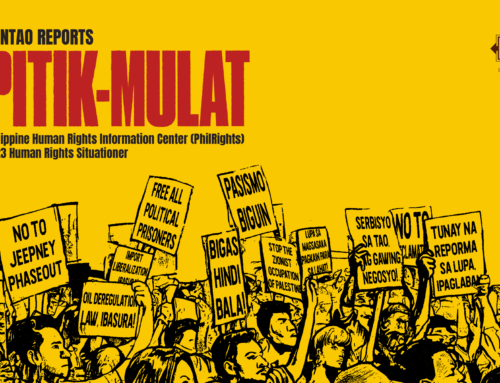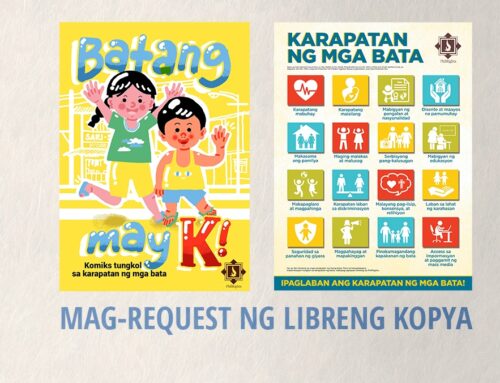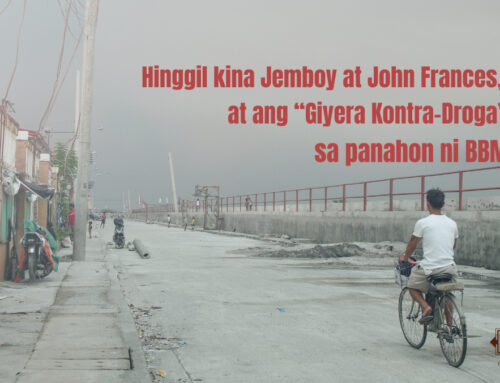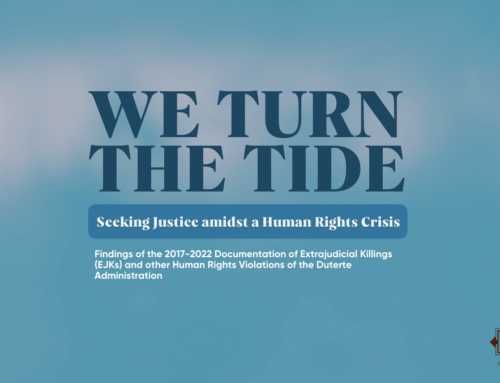NOTE: On February 16-18, 57 street-connected Filipino children gathered in Quezon for the 2nd Street Children’s Congress organized by Bahay Tuluyan as part of its ‘Strengthening Children’s Rights Protection at the Grassroots’ project. Over three days, they reflected on the issues that concern them and their hopes for a better future. Below we are publishing in full their collective statement, borne out of their own reflections.
We are the children that society calls ‘street children’ because we spend most of our time on the street. For us, the street is a place where we can play, relax and spend time with our friends. On the street we learn the skills we need to survive. It is the place where some of us sleep, where we find food and where we work to support ourselves or our families.
Kami ang mga batang tinatawag ng lipunan na ‘batang lansangan’ dahil kadalasan ng aming oras ay ginugugol sa lansangan. Para sa amin, ang lansangan ay isang lugar kung saan kami nakakalaro, nakaka-relax, at kung saan namin nakakasama ang aming mga kaibigan. Sa lansangan, natututo kami ng mga kakayahang kailangan namin para mabuhay. Lugar ito kung saan ang iba sa amin ay natutulog, nakakakuha ng pagkain, and kung saan kami nagtatrabaho para suportahan ang aming sarili o ang aming mga pamilya.
There are many reasons that we end up on the street. Many of these have to do with our families. Some of us have experienced neglect, abuse or violence in our homes. Others don’t feel supported or have been rejected by our families. Some of our families have separated and we are left behind. Some of us have had our houses demolished or we have had to migrate to find work and then we have ended up homeless. Our parents often haven’t finished studying and can’t get good work so we don’t have money. For many of us, there is not enough food at home, so we end up on the street looking for money and food.
Maraming dahilan kung bakit kami napupunta sa lansangan. Karamihan dito ay may kinalaman sa aming mga pamilya. Ang ilang sa amin ay nakaranas ng pagbabaya, panga-abuso o karahasan sa aming mga tahanan. Hindi nararamdaman ng iba na sila’y sinusuportahan o kaya naman ay itinaboy na sila ng pamilya. Ang iba sa aming pamilya ay nagkahiwa-hiwalay at naiwan kami. Ang iba sa amin ay napagiba ang mga bahay o kaya naman ay kinailangan ng aming pamilya lumipat ng lugar para makatrabaho na nagdulot para mawalan kami ng bahay.
Life is hard on the street. It is harder because of some of the big problems we face.
Mahirap ang buhay sa lansangan. Mas mahirap ito dahil sa ilang malalaking problema na aming kinakaharap.
1. RESCUE. We are often running away from being ‘rescued’ by the government. This is because it is done violently and against our will. When in government shelters we are mistreated, the living conditions are very poor and we frequently experience physical, sexual & emotional violence.
RESCUE. Kami ay palaging tumatakbo mula sa pag-‘rescue’ ng pamahalaan. Sa kadahilanang ito ay ginagawa ng may karahasan at labag sa aming kalooban. Kapag nasa loob ng shelters ng gobyerno, kami ay minamaltrato, hindi maayos ang living conditions, at palagi kaming nakakaranas ng pisikal, sekswal, at emosynoal na karahasan.
2. DISCRIMINATION & STIGMA. We frequently experience stigma and discrimination from the general public. We are called names, sworn at, belittled and physically harassed. People assume that because we are on the street that we are bad and that we are criminals.
DISKRIMINASYON AT STIGMA. Palagi kaming nakakaranas ng diskriminasyon at stigma mula sa publiko. Tinatawag kami ng iba’t ibang pangalan, minumura, minamaliit, at pisikal na pananakit. Dahil kami ay nasa lansangan, hinuhusgahan kami ng mga tao na kami ay masasama at mga kriminal.
3. VICES AND GANGS. On the street we are exposed to drugs, solvent, cigarettes, alcohol and gambling. Sometimes our own parents are addicted to drugs or gambling and we work to support their habits. Riots and fighting between gangs is a problem we often face.
MGA BISYO AT GANGS. Sa lansangan, exposed kami sa droga, solvent, sigarilyo, alcohol, at pagsusugal. Minsan, sariling naming mga magulang ang lulong sa droga o pagsusugal at nagtatrabaho kami para masuportahan ang kanilang mga bisyo. Ang mga riot at ayaw sa pagitan ng mga gangs ay problemang madalas naming kaharapin.
4. UNEMPLOYMENT & LACK OF EDUCATION. For many of us, the street is the only way we can earn a livelihood. Many of us are the only breadwinners in our families so we cannot study. Not having an education limits our chances of finding good work. This sometimes leads us to engage in illegal activities. Sometimes, we are forced to sell our bodies to survive.
KAWALAN NG TRABAHO AT EDUKASYON. Para sa karamihan sa amin, ang lansangan ay ang tanging daan para kami ay magkaroon ng ikakabuhay. Marami sa amin ang tanging sumusuporta sa aming pamilya kaya hindi kami makapag-aral. Nalilimitahan ang tiyansa naming makahanap ng maayos na trabaho dahil hindi kami nagkaroon ng sapat na edukasyon. Minsan nagdudulot ito para kami ay sumabak sa mga illegal na Gawain. Minsan, napupwersa rin kaming magbenta ng aming katawan para mabuhay.
5. GOVERNMENT. We often feel that the government can’t or won’t give us the support that we need. We sometimes feel like the government officials who have direct contact with us don’t know their roles and responsibilities. We don’t feel that the government has a clear plan for how to meet our needs.
GOBYERNO. Nararamdaman namin na hindi sinusuportahan o hindi tinutugunan ng gobyerno ang aming mga pangangailangan. Nakakaramdam kami na ang mga opisyales ng gobyerno na direktang nakakasalimuha namin ay hindi alam ang kanilang mga tungkulin at responsibilidad. Hindi namin ramdam na may malinaw na plano ang gobyerno para sa pagtugon ng aming mga pangangailangan.
6. POLICE VIOLENCE. We are frequently in contact with the police, even when we have done nothing wrong. Nearly all of us have experienced violence and torture at the hands of the police. Some police abuse their authority and use us to make money. Being mistreated or hurt by the police makes us feel that we are justified to retaliate and teaches us to fight back. We feel especially threatened and targeted by the war on drugs.
KARAHASAN NG MGA PULIS. Lagi kaming may contact sa mga pulis, kahit na wala kaming ginawang masama. Karamihan sa amin ay nakaranas ng karahasan at pagpapahirap sa kamay ng pulis. May ilang pulis na inaabuso ang kanilang kapangyarihan at ginagamit kami para magkaroon sila ng pera. Dahil sa panga-abuso at pananakit ng mga pulis, natututo kaming lumaban at para sa amin, nararapat lang ito. Nakakaramdam kami ng takot at feeling namin ay parte kami sa pinupuntirya ng war on drugs.

Despite all the hardships we have experienced, we are resilient. We find support from each other and from our friends. NGOs that work on the street are a source of support for us. We look forward to a day when we are acknowledged by the wider community and recognised as humans with dignity.
Sa kabila ng lahat ng paghihirap na dinanas namin, kami ay nakakabangon. Sinusuportahan namin ang isa’t isa at aming mga kaibigan. Ang mga NGO na nagtatrabaho sa lansangan ay isa sa mga sumusuporta sa amin. Umaasa kami sa araw na kami ay kikilalanin ng mas malawak na komunidad at kilalanin bilang mga tao na may dignidad.
We, the children of the Street Children’s Congress 2018, call on the Government to help us to achieve the things that we need:
Kami, mga bata ng Street Children’s Congress 2018, nananawagan sa Gobyerno na tulungan kaming makamit ang mga bagay na kailangan namin:
1. Our basic needs such as affordable food, clothes, health care and medicine
Ang mga pangunahin pangailangan katulad ng murang pagkain, damit, ospital at gamot
2. Free or affordable housing for those who are homeless
Libre o murang pabahay para sa walang bahay
3. Communities that are safe, clean and have places to play
Mga komunidad na ligtas, malinis at may lugar palaruan
4. Equality and protection from discrimination
Pantay-pantay na pagtingin at proteksyon sa diskriminasyon
5. Free education and support to enable us to study including school supplies
Libreng pag-aaral at suporta sa aming pangailangan sa paaralan
6. Decent employment for our parents, without contractualization
Disenteng trabaha para sa aming magulang, na walang contractualization
7. More NGOs to help us and more support for NGOs
Mas maraming NGOs na makakatulong sa amin at suporta para sa mga NGOs
8. Support and care for the elderly and persons with disabilities
Tulong at kalinga para sa mga matatanda at may kapansanan
9. Reproductive health education, care and confidential support
Edukasyon tungkol sa reproductive health, kalinga at tamang suporta
10. Birth registration and identity documents
Pagrehistro na kapanganakan at pagkakakilanlang dokumento
11. Support for our families so that they can care for us and protect us
Suporta para sa pamilya namin upang kami ay kalingain at proteksyonan
We also call on the Government to:
Nananawagan din kami sa Gobyerno na:
1. Respect children’s rights and our freedom
Respetuhan ang karapatang pambata at ang aming kalayaan
2. Stop rescuing us without our consent
Ihinto ang pag-rescue sa amin na wala kaming pahintulot
3. Make government shelters like RAC and Boystown safe for children
Gawin ligtas para sa mga bata ang mga shelter ng gobyerno, tulad ng RAC at Boystown
4. End abuse and violence against children
Itigil ang pangaabuso at karahasan laban sa mga bata
5. End child labor
Itigil ang child labor
6. Stop criminalizing street children
Ihinto ang pagtrato sa mga bata nasa lansangan bilang kriminal
7. Stop Oplan Tokhang
Ihinto ang Oplan Tokhang
8. Stop extrajudicial killings
Ihinto ang extrajudicial killings
9. Recognise us and give us a chance to participate
Kilalanin kami at bigyan ng pagkakataong makilahok
10. Listen to our concerns
Makinig sa aming mga nais sabihin
Made this 18th day of February, 2018 in Quezon, Philippines
Ginawa ngayong ika-18 araw ng Pebrero, 2018 sa Quezon, Philippines
Photographs are courtesy of Bahay Tuluyan.



